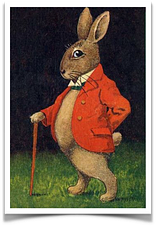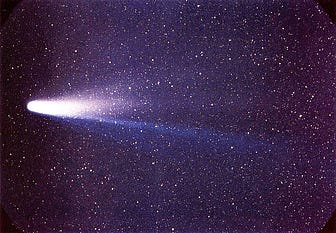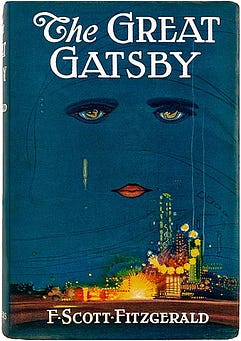Feake Hills, Crooked Waters - Inaugural Issue
The StartWelcome to the first issue of Feake Hills and Crooked Waters. This is a sort of magazine in miniature. It’s not a single-topic newsletter. Instead it has departments. Not all of the departments will appear in each issue — this issue includes these departments (and there will be others, too):
Word of the Day: PoltroonLiterature set in England in the 1700s and 1800s is a good place to find exclamations like “You hare-hearted, milk-livered poltroon!” (1769). It was both a generalized insult and a specific reference to being cowardly. It’s such an apt thing to shout at someone that you still find it in modern works like “Mutiny on the Bounty” from 1951 (“Queeg is a poltroon”) and “Angela’s Ashes” from 1996 (“Mr. O'Dea is yelling, ‘Come out, O'Neill, you chancer, you poltroon.’”) There used to be some disagreement about where “poltroon” came from. In the 1700s, Claudius Salmasius was a well-known historian who claimed the word came from the Latin phrase “pollice truncus.” It meant a thumb injury, and Salmasius thought it referred to Medieval archers who wanted to avoid battle, so they “accidentally” suffered a bad cut on the thumb that made it impossible to use a bow. “Pollice truncus”, the theory went, had been shortened to “poltron”, which was the French version of “poltroon”. That idea lasted about a century. Not bad, as ideas go, but by the 1800s it occurred to somebody that a poltroon, in addition to being a coward, was probably lazy as well, and would prefer to just stay home and loll around on the couch. It just so happens that the Italian word for couch was “poltro”, and “poltron” (the Italian “poltron”, not the French one) meant a lazy person. So according to this story, “poltron” came from “poltro”, because that’s where you’d be likely to find a “poltroon”. That managed to convince the original editors of the Oxford English Dictionary, so that’s the derivation you’ll see in the first edition. More recently, though, the thinking is that “poltroon”, while still derived from Latin, is based on the same word that evolved into “poultry”: “pullus”. To put it another way, when you read about someone being called a “poltroon”, just assume they’re being called chicken. PhotographyThis is from a dockside restaurant in Rockport, MA a few summers ago. That’s a bottle of sparkling water. Taken with an iPhone and unretouched. I was mostly going for the deep blue of the bottle against the lighter blue sky. The refracted view of the harbor in the glass was a lucky accident. From the ForestHare’s Spoiled Trick Beaver was sitting in his library reading a story when there was a knock on his door. It was Hare. “Oh, hello Hare,” said Beaver, “I was just…” “You were reading a story in your library,” said Hare. “I know.” “You do?” “Yes, and then there was a knock on your door and you got up to answer it.” “Oh come on,” said Beaver, “you yourself were the one who knocked.” “That’s beside the point,” said Hare. “It might not have been me.” “How can it be beside the point when as far as I can see,” said Beaver, peering around the front hall, “there isn’t a point anywhere around?” “That’s beside the point too,” said Hare. “Do you remember the other day when you knew about something Raccoon said to me when you weren’t there?” “I remember,” said Beaver, “that I explained to you that I was there, just not the same way you were.” “There you go,” said Hare. “Exactly.” “Exactly what?” said Beaver, who was beginning to wonder if Hare had eaten a bad carrot. “Exactly the point,” said Hare. “How is that a point?” asked Beaver. “Would you like to come in and sit down, Hare? Have a drink of water? Relax? Take some deep breaths?” “The point is that I can do it too!” said Hare. “Look at this.” Hare showed Beaver a sheet of paper where someone with messy handwriting had written “Beaver was sitting in his library reading a story when there was a knock on his door. It was Hare.” “Now do you get it?” said Hare. “I was there in the library earlier, so I know what you were doing.” “Hare,” said Beaver, “when I’m at home, what do I do all the time?” “I don’t know,” said Hare, “I haven’t written that down yet.” “I have a library full of books,” said Beaver. “Why do you think that is?” “Plot device?” asked Hare hopefully. “I like to READ them!” said Beaver. “So any time you knock on my door and I’m home to come answer it, it’s a pretty good guess that I was reading at the time.” “Ha,” said Hare, “that doesn’t prove anything. You might not have been home when I knocked but I knew you would be.” “If I wasn’t home,” said Beaver, “you would just come back later, bring your sheet of paper, and claim it was the first time you came.” “This is the first time,” said Hare. “Prove it,” said Beaver. “Okay, turn that paper over,” said Hare. Beaver turned the paper over, and read “Then Raccoon showed up and said ‘hello, Beaver. Hello, Hare.’” A moment later, Raccoon appeared at Beaver’s door — which he hadn’t had a chance to close — and said “Hello, Beaver. “Hello, Hare.” “Ha!” said Hare again. “See?” “This,” said Beaver, “is just an elaborate trick, Hare. You could have just gone to Raccoon and said ‘let’s play a trick on Beaver; I’ll write down what he was probably doing, and then I’ll write down that you stopped by, and what you said. You just have to remember what you’re supposed to say.’” “Hey,” said Raccoon, “how did you…” “Ha!” said Beaver to Hare. Hare scowled at Raccoon. “The first rule of tricks,” he said sternly, “is that you don’t talk about the trick.” “Oh, sorry,” said Raccoon carelessly. “Now that we’ve gotten past that, though, let’s go do something fun.” “I was doing something fun,” said Hare. “I mean fun for everybody,” said Raccoon. “It’s a nice day, we could see if Otter is home and use his mudslide.” “That does sound like fun,” said Hare. “Okay, let’s go. Beaver, are you coming?” “I’ll be right behind you,” said Beaver. Hare and Raccoon hurried off in the direction of Otter’s house. Beaver took out some papers and shook them gently as he stared into space at nothing in particular. “I know what you’re thinking,” he said to…well, someone. “You were expecting me to have written that whole scene, and that’s how I knew what Hare was up to. And you’re expecting that these…” He waved his bundle of papers, “have all the details. Ha ha ha,” he said, “this is just a list of books I want for my library. Look.” He laid the papers down on the hallway table and pointed to the top of the first one, where somebody with neater handwriting than Hare — but still not terribly neat, really — were the words “Hare wrote down ‘Beaver was sitting in his library reading a story when there was a knock on his door. It was Hare.’” “Hey,” said Beaver, doing a double take on the page. “That’s not right, this is…” Beaver stopped. Scratched his head for a moment. Stared around his foyer. Frowned. Then he shrugged and hurried off to catch up with Hare and Raccoon. The papers slipped off the table and wafted onto the floor in a messy pile. The last line of the last page was just visible. It said “the last line of the last page was just visible.” On this day in historyApril 10 is a day of omens and forebodings. Sort of. Maybe it’s more that there should have been more forebodings and warnings — or people should have paid more attention. In any case, it’s the day the Titanic set sail from Southampton on its maiden voyage to New York. As everybody knows, it never got there. Maybe the appearance of Halley’s Comet, which made its closest-ever approach to Earth on April 10, could have been interpreted as a warning. People have certainly been paying attention to comets throughout the ages, sometimes attaching great significance to their appearance. But this particular visit probably wasn’t really connected with the Titanic, even if you subscribe to such notions. Halley’s Comet made its closest approach to Earth, you see, on April 10 in the year 837. A bit too early to connect to a ship — and for that matter, I wonder what they called it in those days? It didn’t become Halley’s Comet for another thousand years or so. Comets are a bit reminiscent of asteroids, and I bet you didn’t know there’s an asteroid named 4148 McCartney, after Paul McCartney. It was named in 1983, and it’s the second in a series of four: 4147 Lennon, 4148 McCartney, 4149 Harrison, and 4150 Starr. That’s a bit connected to this day in history too, because April 10, 1970 is the day Paul McCartney announced he was leaving the Beatles. Which I’ve heard some people regarded as a disaster, and wished there’d been a warning to pay more attention to. In any case, it definitely made the news, and would have been on the front page of Joseph Pulitzer’s New York World newspaper if it — and Pulitzer — had still been around. Pulitzer might even have made more of an item out of it, because it happened on his birthday, April 10. He would have copyrighted every bit of his newspaper’s coverage, too. He would have been able to do that because of copyright laws. And wouldn’t you know it, the very first one — the Statute of Anne (also known as the Copyright Act of 1710) was enacted on April 10. April 10 has been a good day for the flora and fauna too; the American Society for the Prevention of Cruelty to Animals was founded on this day in 1866, and just six years later in Nebraska, the first Arbor Day was celebrated. And it’s been a good day for writers — F. Scott Fitzgerald’s The Great Gatsby was first published on April 10, 1925. And by the way, did you know that there’s a theory in the world of movie and literary fans that Jay Gatsby, the mysterious hero, was actually Jack Dawson, the hero of the movie Titanic? He would have had to survive, of course, but stranger things have happened in movies. Without even an appearance by Halley’s comet. The FinishThere you have it, the first issue of Feake Hills and Crooked Waters. If you’re wondering about that odd title, it’s connected with Waltham, Massachusetts, where I live. There’s a hill here called Mount Feake, and a well-known graveyard called Mount Feake Cemetery. The cemetery is not directly on Mount Feake, though. However, it sits right next to the Charles River, and on the southwest side there’s a small bay. The native Americans called that bay Quinobiquin, which means crooked. That’s where the name comes from. Besides, I think it sounds good. I hope you like Feake Hills and Crooked Waters. You might have received this issue because you subscribed to my old newsletter, Happened. That had only a single department: “this day in history.” It wasn’t getting very popular, and that’s why I started this one instead. If you don’t like it, feel free to unsubscribe; my feelings won’t be hurt. Or at the least, I’ll eventually get over it. Feake Hills and Crooked Waters will be coming out at least weekly — I suspect more often than that, but time will tell. If you like the newsletter, or would like it to be slightly different in some way, please let me know. And please share the link. Thanks! If you liked this issue of Feake Hills, Crooked Waters, please share it! |
Older messages
April 16 Issue
Monday, May 30, 2022
And it's still not tax day!
Did you see me putting pain in a stone?
Monday, May 30, 2022
The Pompeii issue
The Software Issue
Monday, May 30, 2022
How to become wise?
Bodies in Motion
Monday, May 30, 2022
Somewhere west of Laramie
Repetition
Monday, May 30, 2022
Gimme that beat, boys
You Might Also Like
Community Tickets: Advanced Scrum Master (PSM II) Class of March 26-27, 2025
Tuesday, March 4, 2025
Save 50 % on the Regular Price ͏ ͏ ͏ ͏ ͏ ͏ ͏ ͏ ͏ ͏ ͏ ͏ ͏ ͏ ͏ ͏ ͏ ͏ ͏ ͏ ͏ ͏ ͏ ͏ ͏ ͏ ͏ ͏ ͏ ͏ ͏ ͏ ͏ ͏ ͏ ͏ ͏ ͏ ͏ ͏ ͏ ͏ ͏ ͏ ͏ ͏ ͏ ͏ ͏ ͏ ͏ ͏ ͏ ͏ ͏ ͏ ͏ ͏ ͏ ͏ ͏ ͏ ͏ ͏ ͏ ͏ ͏ ͏ ͏ ͏ ͏ ͏ ͏ ͏ ͏ ͏ ͏ ͏ ͏ ͏ ͏ ͏ ͏ ͏ ͏
eBook & Paperback • Demystifying Hospice: The Secrets to Navigating End-of-Life Care by Barbara Petersen
Monday, March 3, 2025
Author Spots • Kindle • Paperback Welcome to ContentMo's Book of the Day "Barbara
How Homer Simpson's Comical Gluttony Saved Lives
Monday, March 3, 2025
But not Ozzie Smith's. He's still lost, right?
🧙♂️ Why I Ditched Facebook and Thinkific for Circle (Business Deep Dive)
Monday, March 3, 2025
Plus Chad's $50k WIN ͏ ͏ ͏ ͏ ͏ ͏ ͏ ͏ ͏ ͏ ͏ ͏ ͏ ͏ ͏ ͏ ͏ ͏ ͏ ͏ ͏ ͏ ͏ ͏ ͏ ͏ ͏ ͏ ͏ ͏ ͏ ͏ ͏ ͏ ͏ ͏ ͏ ͏ ͏ ͏ ͏ ͏ ͏ ͏ ͏ ͏ ͏ ͏ ͏ ͏ ͏ ͏ ͏ ͏ ͏ ͏ ͏ ͏ ͏ ͏ ͏ ͏ ͏ ͏ ͏ ͏ ͏ ͏ ͏ ͏ ͏ ͏ ͏ ͏ ͏ ͏ ͏ ͏ ͏ ͏ ͏ ͏ ͏ ͏ ͏ ͏ ͏ ͏
I'd like to buy Stripe shares
Monday, March 3, 2025
Hi all, I'm interested in buying Stripe shares. If you know anyone who's interested in selling I'd love an intro. I'm open to buying direct shares or via an SPV (0/0 structure, no
What GenAI is doing to the Content Quality Bell Curve
Monday, March 3, 2025
Generative AI makes it easy to create mediocre content at scale. That means, most of the web will become mediocre content, and you need to work harder to stand out. ͏ ͏ ͏ ͏ ͏ ͏ ͏ ͏ ͏ ͏ ͏ ͏ ͏ ͏ ͏ ͏ ͏ ͏
mRNA breakthrough for cancer treatment, AI of the week, Commitment
Monday, March 3, 2025
A revolutionary mRNA breakthrough could redefine medicine by making treatments more effective, durable, and precise; AI sees major leaps with emotional speech, video generation, and smarter models; and
• Affordable #KU Kindle Unlimited eBook Promos for Writers •
Monday, March 3, 2025
Affordable KU Book Promos "I'm amazed in this day and age there are still people around who treat you so kindly and go the extra mile when you need assistance. If you have any qualms about
The stuff that matters
Sunday, March 2, 2025
Plus, how to build a content library, get clients from social media, and go viral on Substack. ͏ ͏ ͏ ͏ ͏ ͏ ͏ ͏ ͏ ͏ ͏ ͏ ͏ ͏ ͏ ͏ ͏ ͏ ͏ ͏ ͏ ͏ ͏ ͏ ͏ ͏ ͏ ͏ ͏ ͏ ͏ ͏ ͏ ͏ ͏ ͏ ͏ ͏ ͏ ͏ ͏ ͏ ͏ ͏ ͏ ͏ ͏ ͏ ͏ ͏ ͏ ͏ ͏
Food for Agile Thought #482: No Place to Hide from AI, Cagan’s Vision For Product Teams, Distrust Breeds Distrust
Sunday, March 2, 2025
Also: Product Off-Roadmap; AI for PMs; Why Rewrites Fail; GPT 4.5 ͏ ͏ ͏ ͏ ͏ ͏ ͏ ͏ ͏ ͏ ͏ ͏ ͏ ͏ ͏ ͏ ͏ ͏ ͏ ͏ ͏ ͏ ͏ ͏ ͏ ͏ ͏ ͏ ͏ ͏ ͏ ͏ ͏ ͏ ͏ ͏ ͏ ͏ ͏ ͏ ͏ ͏ ͏ ͏ ͏ ͏ ͏ ͏ ͏ ͏ ͏ ͏ ͏ ͏ ͏ ͏ ͏ ͏ ͏ ͏ ͏ ͏ ͏ ͏ ͏ ͏ ͏ ͏







